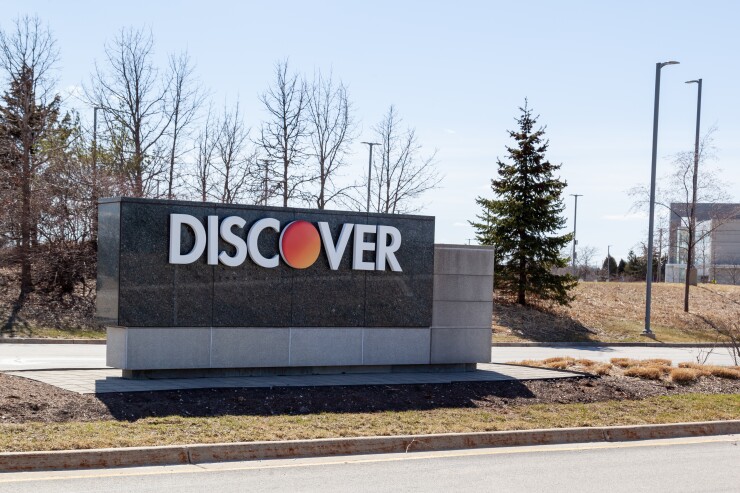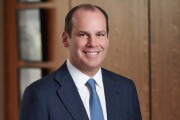
Discover Financial Services is facing broad economic problems hurting Main Street credit card issuers, but certain unique circumstances also caused the institution's fourth-quarter income to tumble 62% to $388 million from more than $1 billion a year earlier. The firm's revenue for the quarter was $4.1 billion, up 13% year-over-year.
The credit card giant grappled with a three-way crisis for the quarter ended Dec. 31, 2023, including a surge in credit card charge-offs and delinquencies, lower consumer spending and hundreds of millions spent to correct problems from a series of regulatory snafus that escalated in the last few years, Chief Financial Officer John Greene told investors on Thursday.
Discover's charge-off rate was 4.1% at the end of the fourth quarter, up from 2.1% over the prior year and up 59 basis points from the prior quarter, surprising investors, who had been reassured of Discover's credit-tightening moves in recent quarters.
Rising losses forced the firm to boost its loan-loss provision by $1 billion to $1.9 billion. Consumer spending also slowed during the fourth quarter to 3% growth, to the point where Discover expects card sales to be relatively flat through 2024.
The Riverwoods, Illinois-based firm's stock fell as low as 15% during Thursday trading to $97 a share from $108 the previous day.
Despite the market's shock, none of the factors dragging Discover's results down were completely unexpected, Greene said in an interview.
"We're seeing the effects of the pandemic play out, because during that time consumers benefited from government transfer payments and suppressed daily spending," Greene said.
When the pandemic ended, consumers began to spend at an accelerated rate—some of it because they had more cash in the bank, he explained. "Now cash has been reduced, and inflation is hurting the lower quartile of consumers, and we're seeing those changes in spending patterns plus an increase in default rates across the entire industry," Greene said.
Discover is already seeing delinquency rates improve, and Greene expects the card charge-off rate to stabilize in the middle of this year and begin falling because of more disciplined underwriting—including the halting of balance-transfer offers. Discover's new account growth during the fourth quarter declined 9% as a result of tightening credit standards.
"Credit is normalizing and performing to our expectations," Greene said in the interview, adding Discover is not seeing any impact yet from resumption of student loan repayments.
The firm is in a period of leadership transition, with interim CEO John Owen still running the enterprise.
Those headaches began with
This week, Discover signed a contract with Nelnet to take over the servicing of its student loan portfolio, and Discover plans to stop accepting new student loan applications on Feb. 1 in anticipation of selling the portfolio later this year, Greene said during an analyst conference.
The firm's student loans amount to about $9.5 billion in total receivables, and the firm is holding $858 million in reserves, so Greene expects the sale of the portfolio will provide a healthy boost to Discover's net interest margin.
Brighter spots in Discover's overall results included a surge in personal loan sales, which rose 23% to $1.9 billion over the same period a year earlier, along with a 19% increase in dollar volume from the firm's Pulse debit network compared with the fourth quarter of 2022. Discover's Diners Club, whose usage was suppressed during the pandemic, also saw a 14% increase in transaction volume compared with the same quarter a year earlier.
Discover ended the year with $128 billion in total loans, up 15% from 2022.
Discover's operating costs during the quarter were up 19% in the fourth quarter, reaching $1.8 billion, which includes spending at a rate of $500 a year to fix compliance problems, but Greene said quarterly expenses won't rise again by double digits.
"The expense guide for mid-single-digit growth was the only positive," said Jefferies analysts in a Wednesday evening note to investors after Discover released its results.






